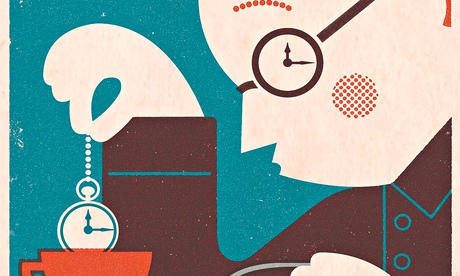
At a new cafe in Shoreditch that made the headlines a few weeks back, you don't pay for your coffee or the Wi-Fi; instead, you pay just to be there, at a rate of 3p per minute. Doubtless this innovative approach will go down well in the vicinity of what I believe we're now supposed to think of as Britain's new technology hub, aka the Old Street roundabout. But a pay-per-minute cafe would put me on edge. Being conscious of how my money's dribbling away is the exact opposite of the mindset I hope to achieve while sipping a latte. My goal is to forget the passage of time, however briefly – not to be reminded that the sooner I leave, the more I'll save.
Maybe this is just my frugal Yorkshire upbringing clashing with fancy London ways. But it's probably an instance of a more universal phenomenon, the flat-rate bias, or (more vividly) the "taxi-meter effect". Generally speaking, we vastly prefer flat rates over metered costs, even when they end up costing us more. This applies to phone bills, bank fees, transport and other services, and not simply because we misjudge how much we'd end up paying were we charged per mile, per call, or whatever. Rather, as Catherine Tucker, an MIT professor, wrote recently in Slate, the research indicates we actively avoid the mental discomfort of linking each unit consumed to extra expenditure – and we're willing to pay to be spared it. At 3p a minute, an hour's coffee comes to £1.80. But it's not necessarily irrational to pay £3 upfront for the same coffee elsewhere: among the things you're buying is the freedom not to think about what you're spending.
Yet in other contexts, people actively seek out the taxi-meter effect, or something close. The unconventional video games designer Chris Crawford, I learned recently, owns 29,216 small plastic beads – one for every day of his life, if he lives to 80. "Each morning," the journalist Simon Parkin explained, "Crawford takes a bead from the jar that holds his future days and places it into the jar that holds the past." (There's a prototype "life countdown" wristwatch, embodying a similar idea, called Tikker.) This is a form of "memento mori", reminding the 63-year-old Crawford not to waste his finite time. But it's also the taxi-meter effect, applied to time instead of money.
The difference is that Crawford's discomfort about his "spending" is the point: it keeps him focused. Having an unlimited plan for your smartphone feels luxurious; having one for your life is just self-delusion.
The trick lies in knowing when and how to harness such discomfort for your own ends. If you're trying to save money, the pain of watching pennies drip away can be helpful, hence the popular advice to record every purchase in a notebook. It's far too easy to structure your whole life around avoiding all discomfort, as the blogger Leo Babauta points out. ("Master your fear of discomfort," he writes, "and you can master the universe," which on reflection perhaps isn't quite as overstated as it seems.) My personal preference is not to be reminded of time ticking by when I'm trying to relax with a coffee. On the other hand, I'm highly tempted to copy Crawford's beads-in-jars scheme. Because, regardless of my personal preferences, time is, unfortunately, ticking by.
oliver.burkeman@theguardian.com
Follow Oliver on Twitter.

